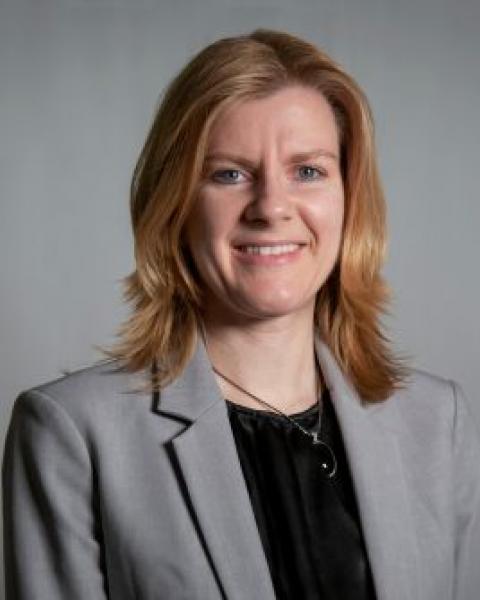How is the financial success of a company determined? What do investors need to know when deciding whether to invest in a business
Professionals refer to accounting reports and consult with accountants for the information they need to make strategic business decisions. A degree in accounting will prepare you for a rewarding career in industry, public, governmental or nonprofit accounting.

Curriculum endorsement and certifications. Our program has earned endorsement by the Institute of Management Accountants (IMA), one of the largest and most respected associations focused exclusively on advancing the management accounting profession. The IMA’s Endorsement of Higher Education initiative recognizes programs that meet high educational standards, enabling students to pursue and earn the CMA credential. This is a testament to the quality of our curriculum which will benefit both the future careers of our students and the organizations where they will work. Further, students can earn multiple certifications throughout their coursework including a Financial Planning and Analysis certification and Data Analytics and Visualization certification from the IMA, as well as certifications in Microsoft Excel, and Intuit’s QuickBooks Online just to name a few.
The Bachelor of Science (BS) in Accounting degree program is designed to prepare graduates for a variety of careers in public, corporate, governmental, non-profit, or small business accounting. If desired, program graduates are well-prepared to seek professional certification as a Certified Public Accountant (CPA), Certified Management Accountant (CMA), Certified Fraud Examiner (CFE), or alternative. Graduates of the Accounting program possess vital technical, analytical, and decision-making skills and knowledge for entry into the accounting profession, while also having the background needed to advance into high-level financial management positions.
Explore various career pathways in accounting. Our updated degree requirements allow students the flexibility and choice to pursue various career pathways within the field of accounting. These new career pathways include the following:
- Public Practice Pathway (supports students interested in pursuing a CPA credential)
- Fraud, Forensic, and Information Technology Pathway (supports students interested in pursuing a CFE credential)
- Private, Governmental, and Nonprofit Pathway (supports students interested in pursuing a CMA credential)
Further, our program updates provide students with the ability to pair their accounting major with a variety of potential minors that align with their career pathway including Communications, Psychology, Criminal Justice, Cybersecurity, Computing, Information Technology, Economics, and Data Analytics.
Interested in a career in public accounting? The BS in Accounting program has recently been revised to align with the 2024 CPA Evolution ensuring that students are eligible to sit for the multi-part series of exams upon graduation with their undergraduate degree. The BS in Accounting program can be paired with the one-year Master of Business Administration (MBA) with a Graduate Certificate in Accounting program allowing students to earn both degrees in only five years. Upon earning both degrees, students will have met the 150-credit hour minimum currently required for CPA licensure in most states. Note: CPA licensing requirements vary from state to state and are subject to change. Students should review the specific state requirements for where they seek licensure or consult with their academic advisor.
All baccalaureate business degree programs offered are nationally accredited by the Association of Collegiate Business Schools and Programs (ACBSP).
Curriculum & Requirements
ACCOUNTING, Bachelor of Science (120 credits)
The Bachelor of Science (BS) in Accounting degree program is designed to prepare graduates for a variety of careers in public, corporate, governmental, non-profit, or small business accounting. If desired, program graduates are well-prepared to seek professional certification as a Certified Public Accountant (CPA), Certified Management Accountant (CMA), Certified Fraud Examiner (CFE), or alternative. Graduates of the Accounting program possess vital technical, analytical, and decision-making skills and knowledge for entry into the accounting profession, while also having the background needed to advance into high-level financial management positions.
Interested in a career in public accounting? The BS in Accounting program has recently been revised to align with the 2024 CPA Evolution ensuring that students are eligible to sit for the multi-part series of exams upon graduation with their undergraduate degree. The BS in Accounting program can be paired with the one-year Master of Business Administration (MBA) with a Graduate Certificate in Accounting program allowing students to earn both degrees in only five years. Upon earning both degrees, students will have met the 150-credit hour minimum currently required for CPA licensure in most states. Note: CPA licensing requirements vary from state to state and are subject to change. Students should review the specific state requirements for where they seek licensure or consult with their academic advisor.
All baccalaureate business degree programs offered are nationally accredited by the Association of Collegiate Business Schools and Programs (ACBSP).
| Course | Title | Credits |
|---|---|---|
| Business Common Component | ||
| BUS 1100 | Introduction to Marketing and Sales | 4 |
| BUS 1200 | Business Law and Ethics (DICO) | 4 |
| BUS 1300 | Digital Information Technologies (TECO) | 4 |
| BUS 1400 | Principles of Economics (GACO) | 4 |
| BUS 2000 | Financial & Managerial Accounting | 4 |
| BUS 2200 | Management and Decision Making | 4 |
| BUS 2300 | Business Writing and Presenting (WRCO) | 4 |
| BUS 2400 | Financial Management | 4 |
| Accounting Major Requirements | ||
| ACC 3112 | Intermediate Accounting I | 4 |
| ACC 3122 | Intermediate Accounting II | 4 |
| ACC 3142 | Cost Accounting | 4 |
| ACC 3170 | Income Taxes | 4 |
| ACC 4100 | Accounting Info Systems and Analytics (QRCO,TECO) | 4 |
| Choose a minimum of four credits from the following: | 4 | |
ACC 4888 | Accounting Internship | |
MGM 4900 | Strategy & Sustainable Competitive Advantage | |
| Accounting Focus Area Requirements | ||
| Choose eight credits from the following: | 8 | |
ACC 3050 | Accounting with QuickBooks | |
ACC 3100 | Fraud and Forensic Accounting | |
ACC 4110 | Governmental and Nonprofit Accounting | |
ACC 4122 | Advanced Accounting | |
ACC 4180 | Auditing Theory & Practice | |
| Accounting Pathways Requirement 2 | ||
| Choose eight credits from the following: | 8 | |
ACC, BU, BUS, CJ, CM, CS, CY, DAT, EC, ECN, FIN, LAW, MGM, or PS 3@,4@ | ||
| Finance/Economics Requirements | ||
| Choose four credits of FIN or ECN 3000+ level courses. | 4 | |
| Mathematics Foundations | ||
| MA 2210 | Finite Math with Business Statistics (QRCO) | 4 |
| General Education | ||
| EN 1400 | Composition | 4 |
| IS 1115 | Tackling a Wicked Problem | 4 |
| CTDI | Creative Thought Direction | 3-4 |
| PPDI | Past and Present Direction | 3-4 |
| SIDI | Scientific Inquiry Direction | 3-4 |
| SSDI | Self and Society Direction | 3-4 |
| Directions (choose from CTDI, PPDI, SIDI, SSDI) 1 | 4-8 | |
| INCP | Integrated Capstone | 0-4 |
| WECO | Wellness Connection | 3-4 |
| Free Electives | 5-8 | |
| Total Credits | 120 | |
- 1
Directions should total 20 credits (unless the major has a waiver for a specific Direction).
- 2
Pathway credits align with potential professional certifications and include public; fraud, forensics, and information systems; and private, governmental, and nonprofit options. Career pathway credits also support the declaration of a variety of minors.
Check all course descriptions for prerequisites before planning course schedule. Course sequence is suggested but not required.
To complete the bachelor’s degree in 4 years, you must successfully complete a minimum of 15 credits each semester or have a plan to make up credits over the course of the 4 years. For example, if you take 14 credits one semester, you need to take 16 credits in another semester. Credits completed must count toward your program requirements (major, option, minor, certificate, general education or free electives).
| Year One | Credits | |
|---|---|---|
| EN 1400 | Composition | 4 |
| IS 1115 | Tackling a Wicked Problem | 4 |
| MA 2210 | Finite Math with Business Statistics (QRCO) | 4 |
| BUS 1100 | Introduction to Marketing and Sales | 4 |
| BUS 1200 | Business Law and Ethics (DICO) | 4 |
| BUS 1300 | Digital Information Technologies (TECO) | 4 |
| BUS 1400 | Principles of Economics (GACO) | 4 |
| CTDI | Creative Thought Direction | 3-4 |
| Credits | 31-32 | |
| Year Two | ||
| BUS 2000 | Financial & Managerial Accounting | 4 |
| BUS 2200 | Management and Decision Making | 4 |
| BUS 2300 | Business Writing and Presenting (WRCO) | 4 |
| BUS 2400 | Financial Management | 4 |
| Directions (choose from CTDI, PPDI, SIDI, SSDI) 1 | 3-4 | |
| PPDI | Past and Present Direction | 3-4 |
| SSDI | Self and Society Direction | 3-4 |
| SIDI | Scientific Inquiry Direction | 3-4 |
| Credits | 28-32 | |
| Year Three | ||
| ACC 3112 | Intermediate Accounting I | 4 |
| ACC 3122 | Intermediate Accounting II | 4 |
| ACC 3142 | Cost Accounting | 4 |
| ACC 3170 | Income Taxes | 4 |
| ECN/FIN Focus | 4 | |
| INCP | Integrated Capstone | 4 |
| Directions (choose from CTDI, PPDI, SIDI, SSDI) | 3-4 | |
| WECO | Wellness Connection | 3-4 |
| Credits | 30-32 | |
| Year Four | ||
| Free Electives | 2-3 | |
| ACC Focus Area | 8 | |
| Pathways Focus Area | 8 | |
| MGM 4900 or ACC 4888 |
Strategy & Sustainable Competitive Advantage or Accounting Internship |
4 |
| ACC 4100 | Accounting Info Systems and Analytics (QRCO,TECO) | 4 |
| Electives | 5-8 | |
| Credits | 31-35 | |
| Total Credits | 120 | |
- 1
Directions should total 20 credits (unless the major has a waiver for a specific Direction).
Mastery of Technical Accounting Knowledge: Program graduates will demonstrate a comprehensive understanding of fundamental accounting principles including financial reporting, individual and business taxation, cost accounting, the theory and practice of auditing, accounting information systems, governmental and non-profit accounting, and the impact of data analytics on the field.
Proficiency in Relevant Tools and Technology: Program graduates will be proficient in using modern accounting tools and software to work with and analyze data enabling them to easily adapt to and support organizations in their adoption of emerging technologies bolstering productivity in the workplace.
Possession of Critical Thinking and Decision-Making Skills: Program graduates will possess vital critical thinking and decision-making skills resulting from continuous practice throughout the curriculum allowing them to interpret, analyze, and communicate financial information in support of organizational goals accurately and effectively.
Awareness of Ethics and Personal Accountability: Program graduates will command a strong awareness of the importance of ethical practice, professional integrity, and individual accountability and its impact on compliance with generally accepted accounting principles, organizational sustainability, personal reputation, and career longevity.
Graduates of the Plymouth State BS in Accounting program are prepared for a variety of careers in public, corporate, governmental, non-profit, or small business accounting in roles such as a tax accountant, auditor, cost accountant, forensic accountant/fraud examiner, comptroller/CFO, or budget/financial analyst. Students can go on to work for public accounting firms, public or private corporations, local, state, or federal governments, non-profit organizations, or charities, or support their own or someone else’s small business endeavors.
Explore Program Details
-
Associate ProfessorProgram Coordinator, AccountingEmail: jkdemoras@plymouth.eduPhone: (603) 535-2597
More to Explore
Explore Today.
Realize Tomorrow.






